Outforia Quicktake: Key Takeaways
- Octopuses are highly intelligent but have short lifespans, ranging from 6 months to 5 years depending on the species.
- They die shortly after laying their eggs due to a process called senescence, with females experiencing self-destructive behavior and eventual death.
- The death of female octopuses may be related to increased production of steroid hormones, which researchers believe could be a protective mechanism for offspring.
- Octopuses have three hearts, can change the color and texture of their skin, and are cannibalistic.
- Giant Pacific Octopus is the largest species, and Blue-Ringed Octopus is one of the most deadly.
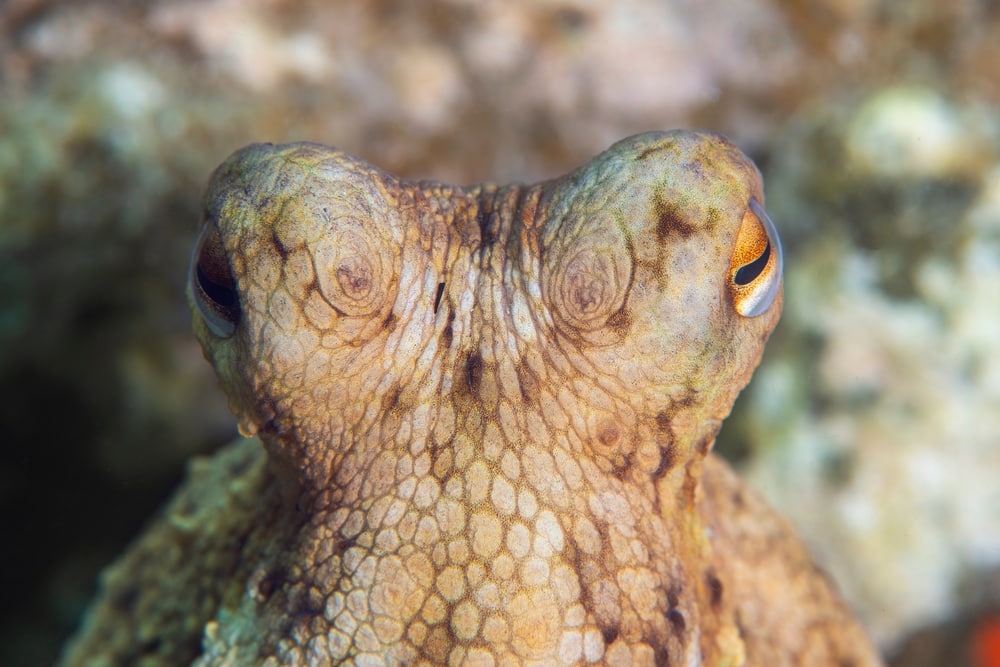
Maybe you’ve never wondered about the lifespans of octopuses, but you should. Why? Because the end of their lives is interesting and ends in tragedy.
So, how long do octopuses live? And why is it considered a tragedy?
Octopuses are one of the most intelligent creatures on the planet, but they live very short lives. Most species only live for about 1-4 years. Still, that’s not the tragic part.
Octopuses die shortly after laying their eggs. This isn’t uncommon in the animal kingdom. What is uncommon is how the octopuses die. The death isn’t pleasant, and researchers have just recently discovered why.
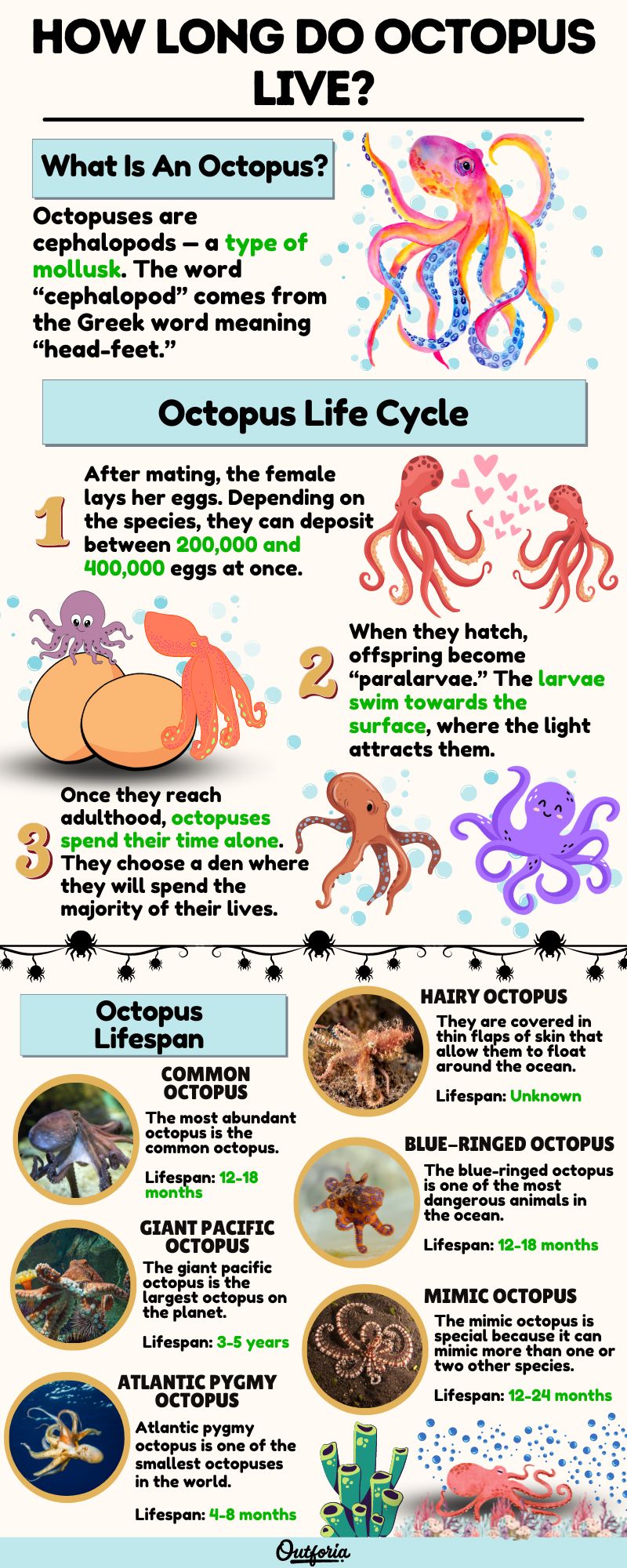
SHARE THIS IMAGE ON YOUR SITE
<a href="https://outforia.com/how-long-do-octopus-live/"><img style="width:100%;" src="https://outforia.com/wp-content/uploads/2022/12/How-Long-Do-Octopus-Live-infographics-11122022.jpg"></a><br>How Long Do Octopus Live <a href="https://outforia.com">Outforia</a>You May Also Like: 15 Different Types Of Jellyfish You Need To Know: Chart And Pictures
How Long Do Octopuses Live?
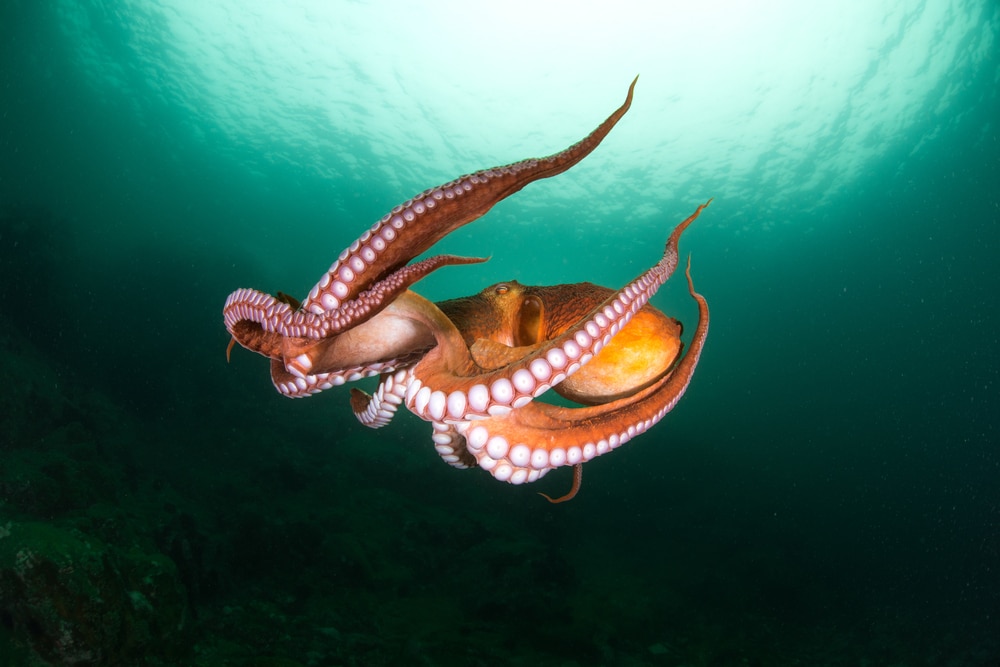
Unfortunately, shallow-dwelling octopuses have a short lifespan. The average lifespan of most species is about two years. Some species may only live for 6 months, while others may live for up to 5 years.
Deep-water-dwelling octopuses are not as well studied. But research shows that some species may live for 15-18 years. This is much longer than their shallow-dwelling cousins.
What Is An Octopus?
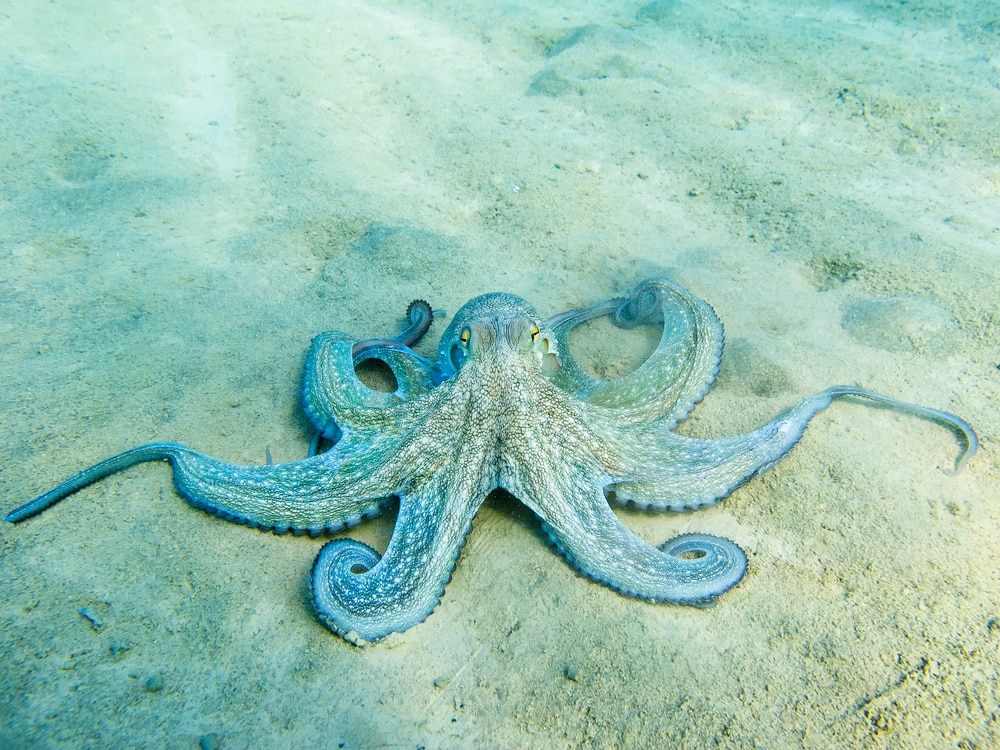
Octopuses are cephalopods — a type of mollusk. The word “cephalopod” comes from the Greek word meaning “head-feet.” Cephalopods also include cuttlefish and squid.
There are over 300 species of octopuses in the world. This is significant considering there are only 800 species of cephalopods in total.
We generally classify octopuses as any mollusk with eight arms. This includes any species in the order Octopoda. Yet, true octopuses are in the genus “Octopus.” They live throughout the world’s oceans in shallow bodies of water.
Octopuses come in all different shapes and sizes. The smallest octopus (Octopus arborescens) only reaches about 2in (5cm) long.
On the other end of the spectrum, the largest octopus is the giant Pacific octopus. It can reach up to 18ft (5.4m) long with an arm span of up to 30ft (9m).
Most types of octopus have a sac-like body with a head that is barely separate from the rest of the body. Their eyes are large, and they have eight long arms. Each arm has two rows of suckers to grip its prey.
At the base of their arms lies the mouth, which has a pair of sharp beaks. It also contains an organ called a “radula.” It uses the radula for drilling through shells and stripping flesh.
Most octopuses move by crawling along the bottom of the ocean. They also have a short siphon through which they expel water.
The siphon is generally used as a part of respiration. But octopuses can use it when frightened, too. They can shoot a jet of water through their siphon, shooting them backward.
When frightened, they can also dispel an ink-like substance. It acts as a distraction against the attacker. In some species, the ink can even paralyze the sensory organs of the animal it touches.
Octopuses Are One of the Smartest Animals in the World
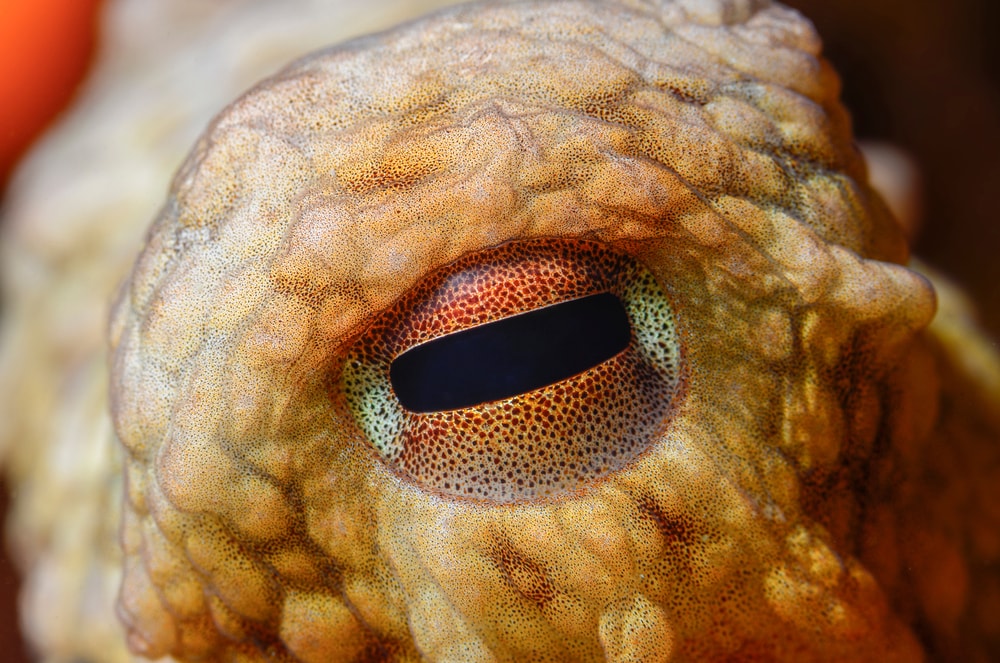
Generally, invertebrates aren’t the most intelligent animals in the world. Yet, the octopus has many vertebrates beat!
Octopuses have a large brain and complex nervous system. In fact, they have almost as many neurons as dogs do. This means they have many receptors that can send messages to their brain.
Their brains are so impressive that one part is used solely for learning. This part of their brain helps to solve problems — something other invertebrates can’t do.
Researchers and aquarists continue to be amazed by how smart these creatures are.
Take Inky the Octopus, for example. This octopus lived at the New Zealand Aquarium. It managed to escape its enclosure through a small gap. It then went down a 164 ft (49.9m) drainage pipe and into the bay.
How Do Octopuses Reproduce?
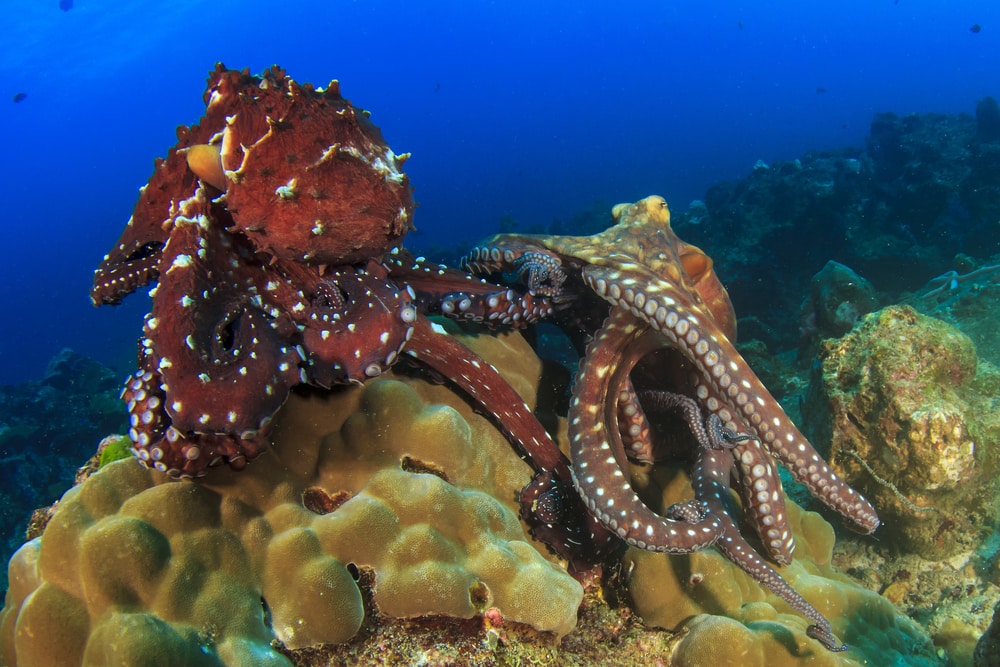
So, how do octopuses mate? The process is rather fascinating, but it doesn’t end well.
A male octopus has a specialized arm for mating. This is usually the third right arm, which he uses to deposit sperm.
The male begins by inserting his specialized arm into the female’s mantle cavity. He will then release the sperm to fertilize the eggs.
Sometimes, the male will not insert his sperm into the female. Instead, he will “hand” her the sperm to safeguard them until she is ready for fertilization.
How Do Octopuses Die After Mating?
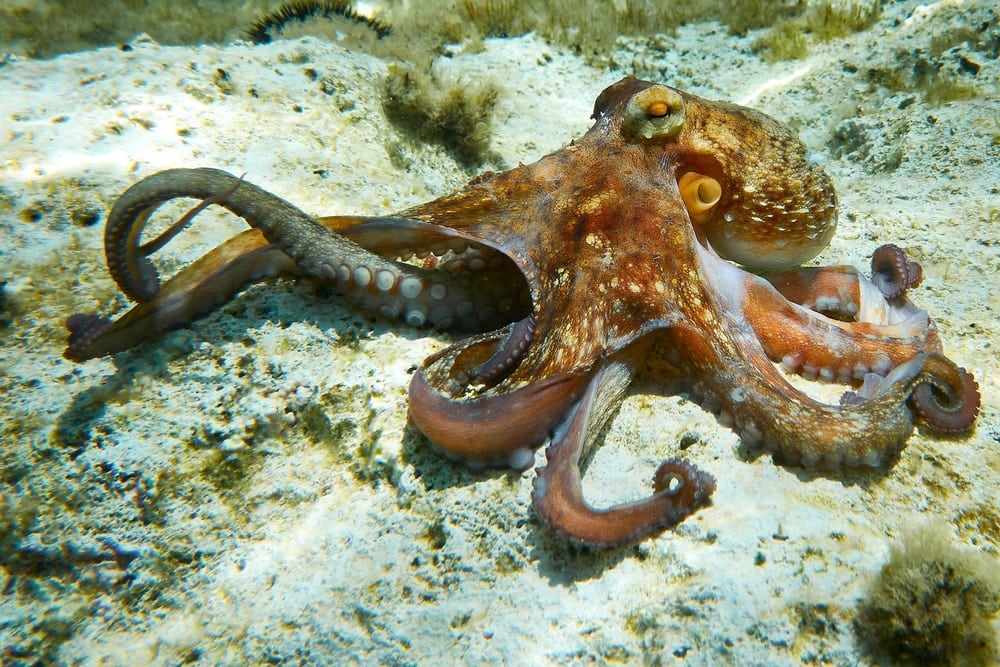
The bad part is that octopuses die shortly after mating in a process called “senescence.”
The male will live for a few months after mating before dying. The female has a similar lifespan but stays alive slightly longer to guard her eggs. After the eggs hatch, she will die.
As an octopus dies, its body begins to shut down and give up on them. First, it will begin to lose its appetite. Then, it will have trouble moving, its movements uncoordinated and difficult. Finally, it will begin to develop white lesions all over its body which will not heal.
A Mother’s Death
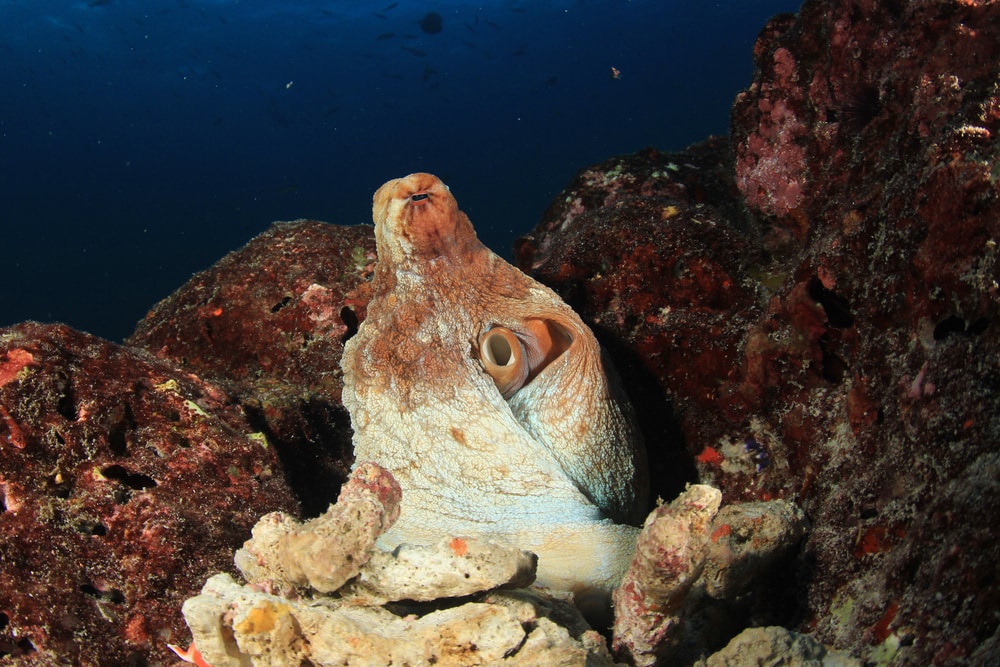
The slow death of a female octopus comes about in phases. For about 3-4 days after laying her eggs, she will watch over the eggs. She is tender to them, stroking them and blowing water over them. Although she won’t go out to hunt, she will still eat if prey happens to come by.
In the next 8-10 days, she will stop eating entirely. She becomes more agitated and will have trouble moving.
Even more horrifying, she will begin to self-mutilate in the last phase. She leaves her brood and seems to try to kill herself.
Researchers have seen mothers beating themselves against rocks. They rip apart their skin and even eat pieces of their arms.
After the eggs hatch, the mother has fulfilled her purpose. At once, her body begins to rapidly deteriorate. Her body’s cells begin to destroy themselves. This kills the tissues and causes the organs to shut down, causing her to die.
But why do octopuses die after mating? What is the purpose? Why are mothers so determined to destroy themselves after laying eggs?
Why Do Female Octopuses Die After Mating?
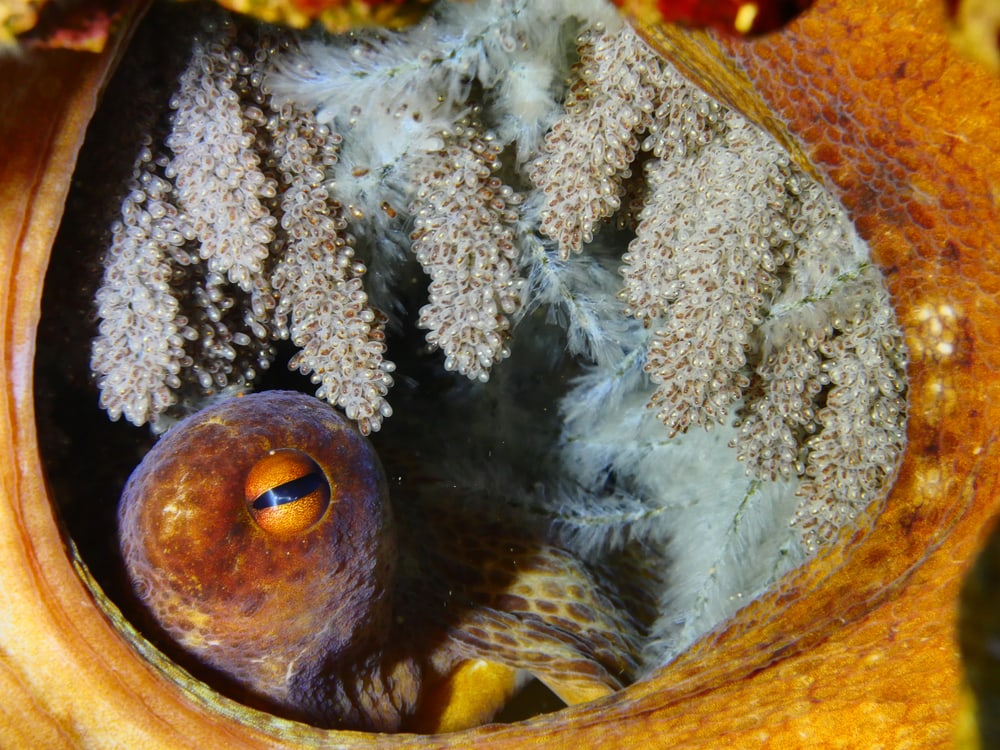
For a long time, researchers didn’t know the answer to this question. Today, the answer seems to lie within the chemicals that their bodies secrete.
After laying eggs, the production of cholesterol in the body changes. This causes an increase in the production of steroid hormones. The increase seems to instigate rapid deterioration and death in female octopuses.
Chemical Changes
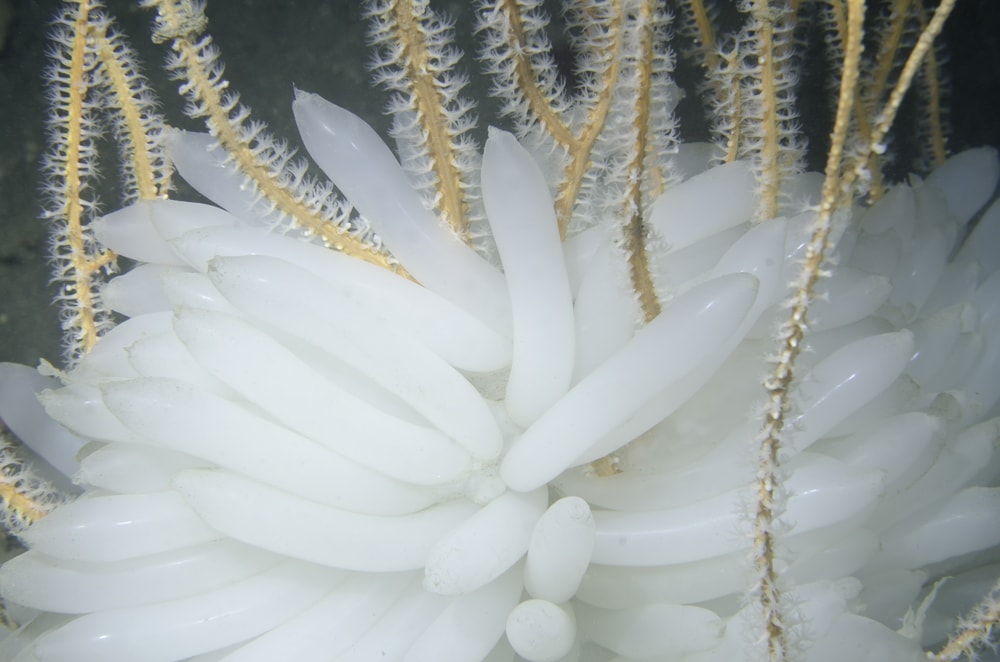
Research done in 1977 began to determine the cause of death. It showed that a mother octopus’ self-destruction lies in her optic glands.
The researchers found that when they cut the nerves to the optic gland, the mother abandons her eggs. She begins to eat again and will continue living for another 4-6 months.
Yet, researchers weren’t sure why the optic gland incited self-destruction.
Z. Yan Wang is an assistant professor of psychology and biology at the University of Washington. In 2018, Wang and her team set out to perform new research. They discovered that steroid overproduction happens within the optic gland.
After laying eggs, the levels of the hormones pregnenolone and progesterone rose. Animals use these hormones in reproduction. The production of 7-dehydrocholesterol also increased — the building block of cholesterol.
Lastly, they produced more of the components needed for making bile acids. A similar set of acids controls the lifespan of a type of worm popular in research.
Wang believes these bile acids are linked with controlling the lifespans of invertebrates.
What Is the Purpose of Their Death?
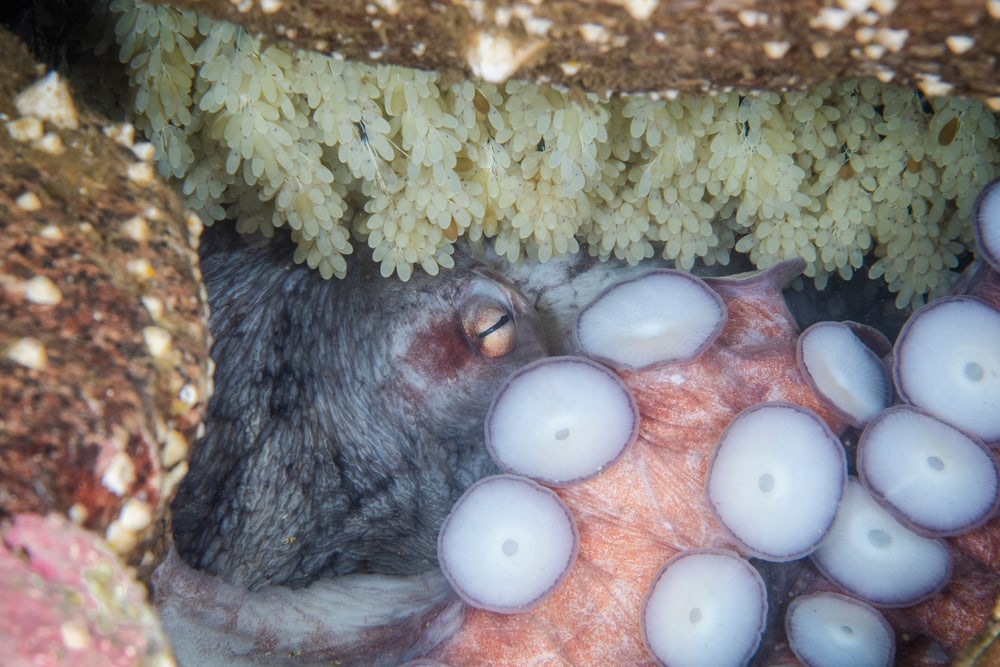
Still, researchers aren’t sure why a female octopus’s body reacts this way. Some theories suggest that it’s likely a way to protect the offspring. By dying in such a dramatic way, the mother draws predators toward herself and away from the eggs.
Another theory suggests that the mother releases nutrients into the water. These nutrients would support the eggs.
Wang has another theory. She believes death is to protect the offspring from its own mother. Though mothers are incredibly protective of their eggs, octopuses are still cannibals. They would likely eat their offspring if they stayed around after they hatched.
Why Do Male Octopuses Die After Mating?
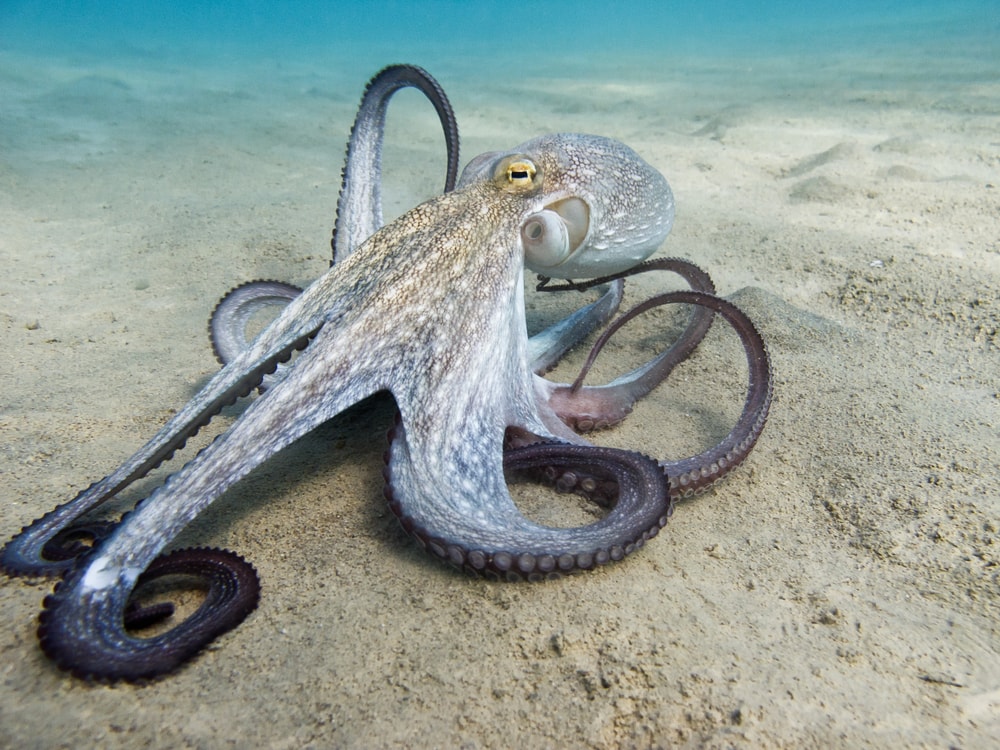
Researchers are still unsure why males also die shortly after mating. Males swim away and abandon their partners after mating. He does not share in any parental duties, so he does not have the same obligation to protect as the mother does.
For now, this remains a mystery.
You May Also Like: How Do Eels Reproduce? The Mystery Of Eel Sex Explained
Octopus Life Cycle
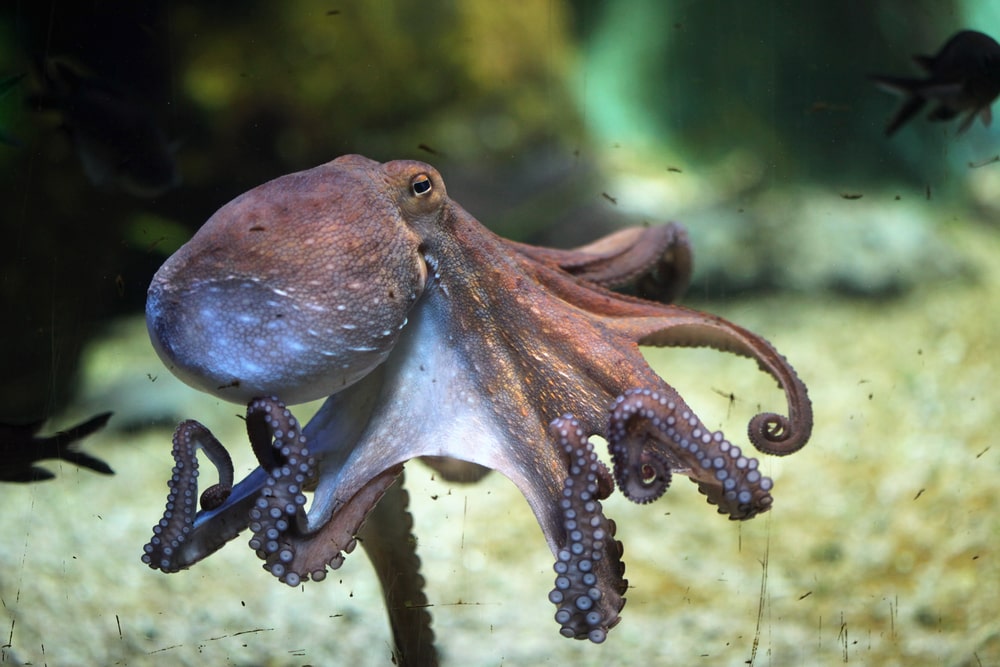
An octopus’ life is dangerous from start to end. Not only do they die after mating, but only 1% of eggs will survive to adulthood.
Eggs
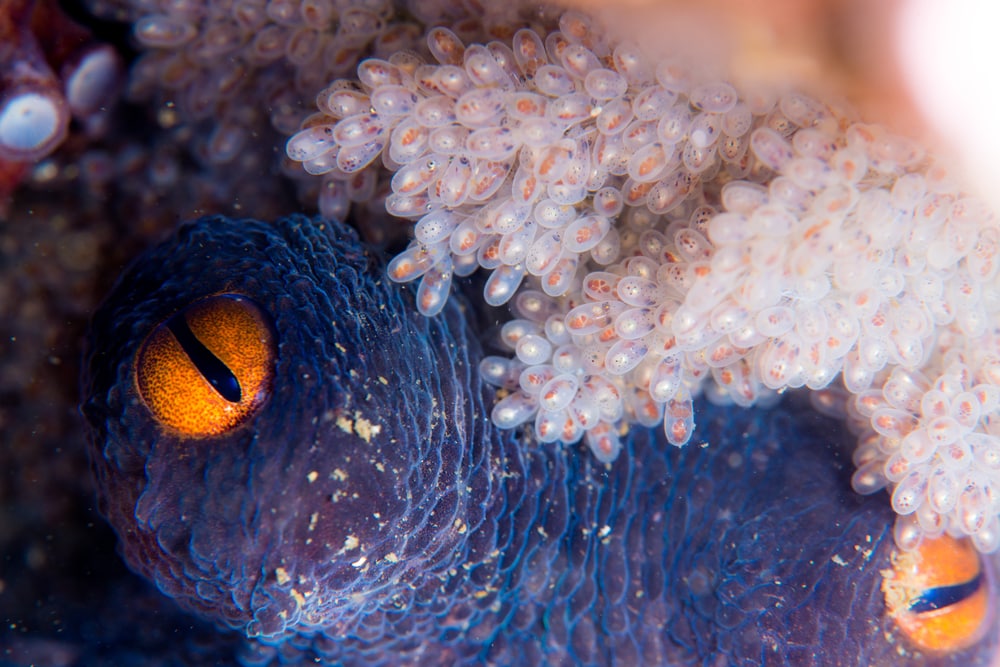
After mating, the female lays her eggs. Depending on the species, they can deposit between 200,000 and 400,000 eggs at once. The eggs are tiny, no larger than a pinky nail, and are enclosed in a protective egg sack.
Octopuses lay so many eggs because they have an incredibly low survival rate. Although many eggs may hatch, only a few survive to adulthood. Often, only one or two offspring survive out of the clutch.
After she lays the eggs, the mother ties all the eggs together into long cords. These long cords of eggs allow for better protection and are easier for her to guard.
In most species, the eggs will incubate for about 30-40 days. The incubation period varies depending on the temperature of the water.
Cold water slows down the incubation time. Warm water increases metabolic processing, helping the babies to hatch faster.
Paralarvae
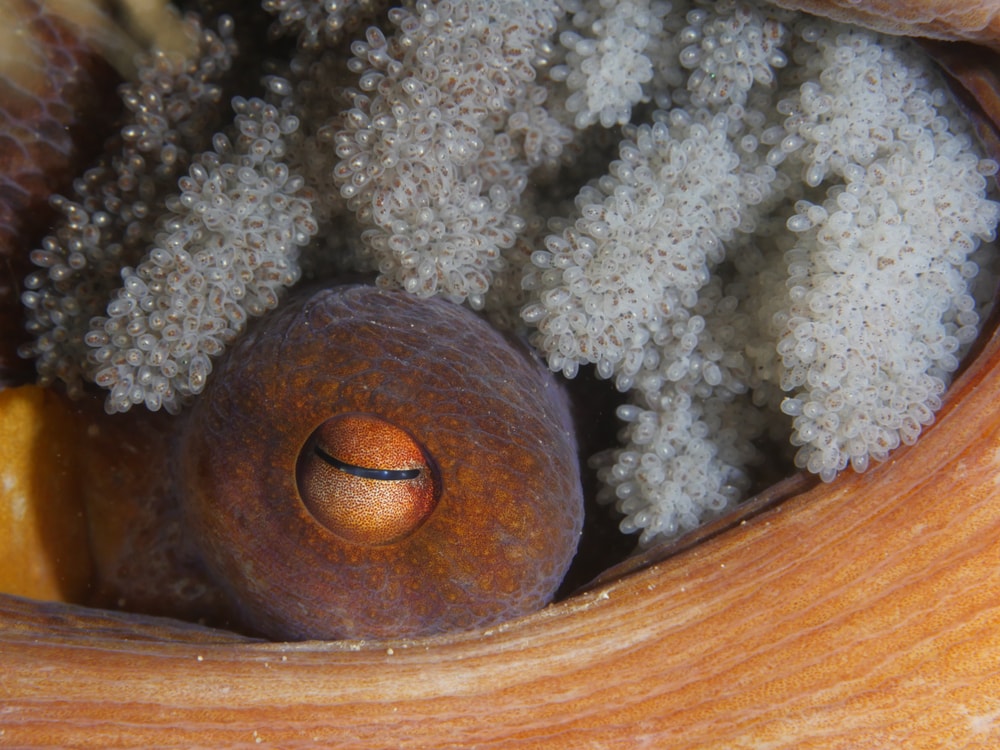
When they hatch, offspring become “paralarvae.” The larvae swim towards the surface, where the light attracts them. They drift through the ocean in a large group called a “plankton cloud.”
They spend their time eating the larvae of other species until they mature. They are very vulnerable during this time. They are constantly in danger of becoming prey to other plankton eaters.
Subadult
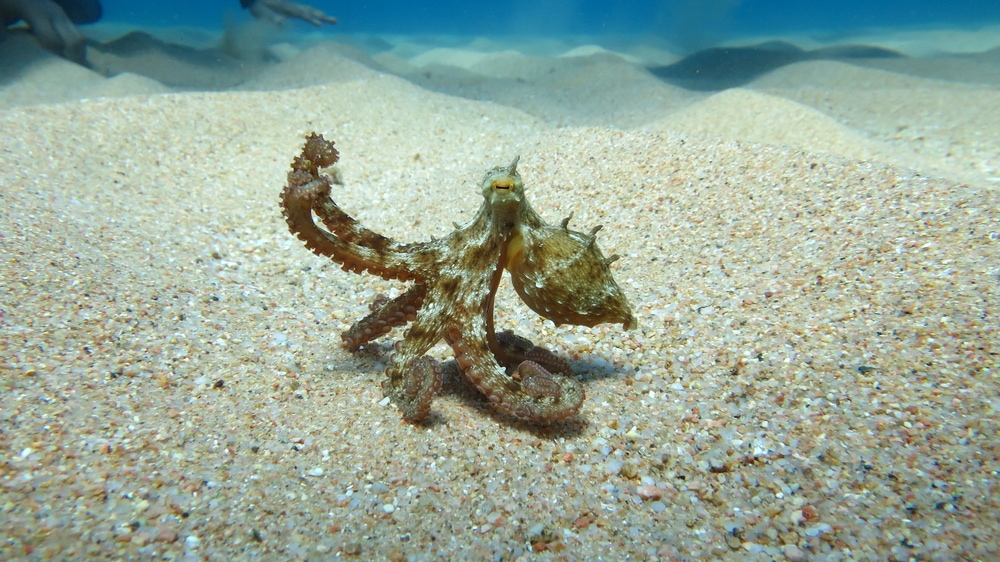
As they mature, they reach the “subadult” phase before reaching full adulthood. For many species, the subadult will find a resting spot on a reef where their goal is to eat as much as they can. Increasing in size is their main goal because it increases their chances of survival.
They need to put on as much weight as they can, as quickly as they can. In some cases, octopuses can put on as much as 1% of their body weight every day.
Adulthood
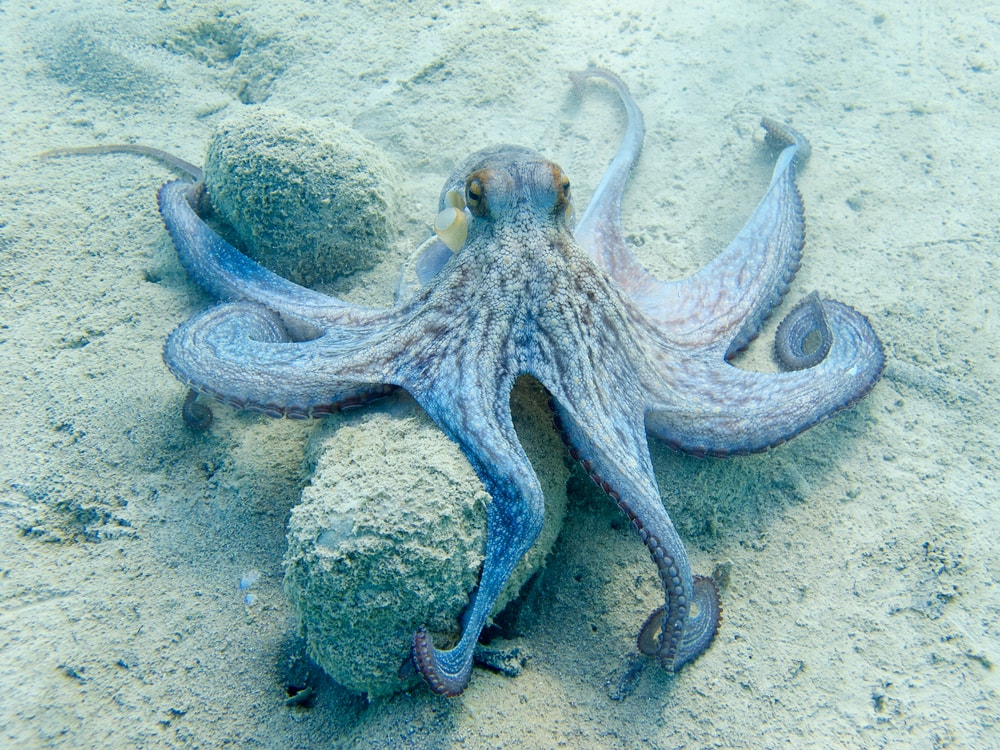
Once they reach adulthood, octopuses spend their time alone. They choose a den where they will spend the majority of their lives.
The den is large enough that the octopus can easily fit inside. But it’s small enough that predators can’t reach them. They only leave their den for a few hours a day to hunt for food or to search for a mate.
You May Also Like: How Long Do Tortoises Live? Everything You Need To Know About Their Lifespan
Octopus Lifespan
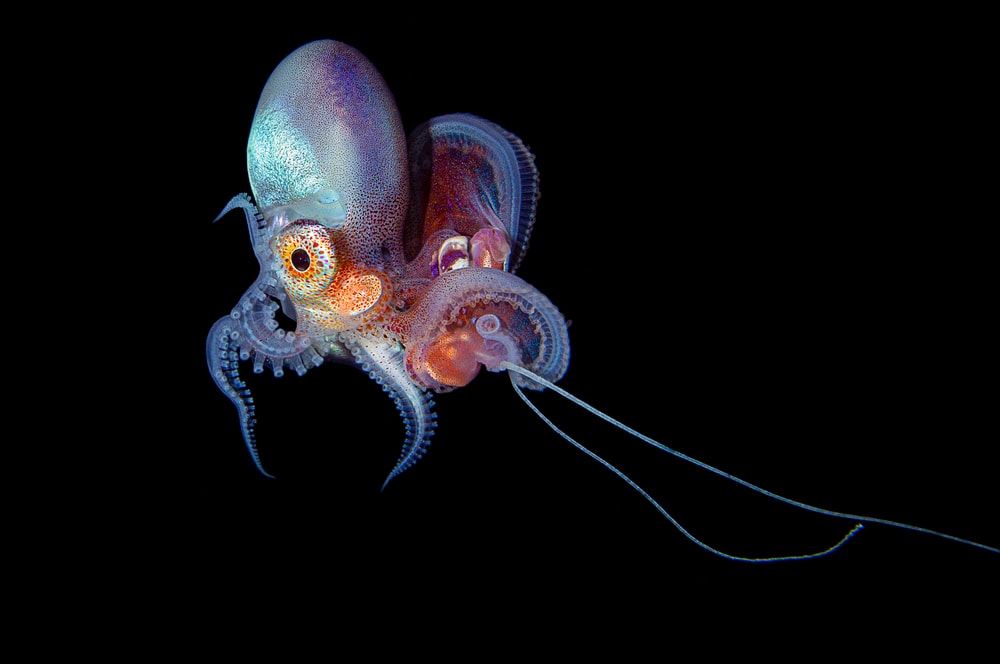
Octopuses have very short lifespans. This is unfortunate, considering they’re one of the smartest animals on the planet. How long they live depends on the species. Their lifespan in captivity does not seem different from their lifespan in the wild.
On the shorter end, some octopuses live for just 6 months. On the higher end, they may live for up to 5 years.
The Common Octopus (Octopus vulgaris)
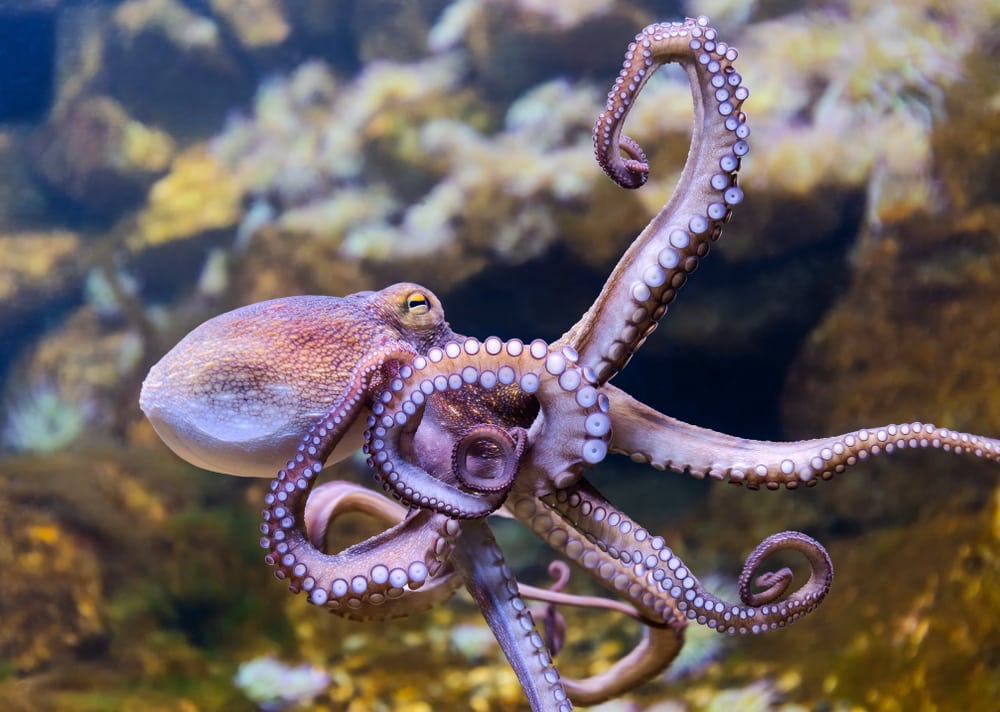
The most abundant octopus is the common octopus. It is a medium-sized octopus. It lives across tropical and temperate oceans throughout the world.
This octopus is the most common but also the most intelligent invertebrate in the world. It has pigment-bearing cells that are highly developed. These cells can change the color of the skin, and they can do so rapidly.
Lifespan: 12-18 months
The Giant Pacific Octopus (Enteroctopus dofleini) — The Largest & Longest-Lived Shallow-Dwelling Octopus
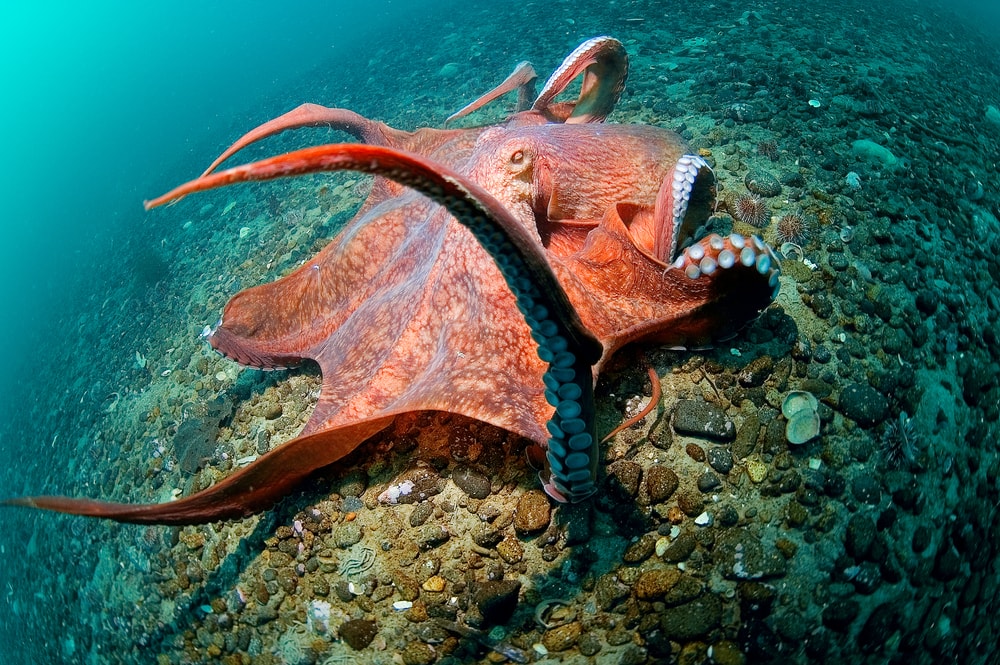
The giant pacific octopus is the largest octopus on the planet. Its body can reach a span of 9.75-16ft (2.74-4.88m). Despite their massive size, they weigh almost nothing. The average weight of these octopuses is just 22-110lbs (9.98-49.9kg).
Although this is an average, the largest giant Pacific octopus dwarfed its cousins. The largest octopus that ever lived grew to a staggering 30ft (9.14m) long and more than 600lbs (272.16kg).
Lifespan: 3-5 years
The Atlantic Pygmy Octopus (Octopus joubini) — Shortest Lifespan
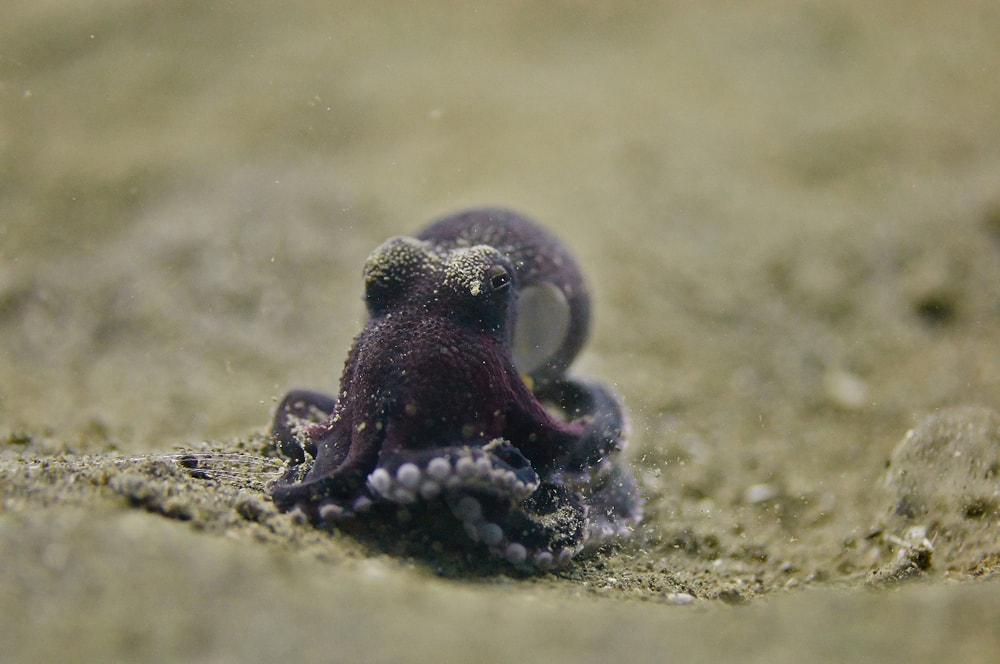
The Atlantic pygmy octopus is one of the smallest octopuses in the world. It also has the shortest lifespan. They only grow to about 5.9in (15cm) long and only live for about 4-8 months.
They are also known as one of the smartest species of octopuses. They have very good vision and seek shelter in the most unique of places. They may hide in clamshells, cans, and other small cavities. After climbing inside, they will even create their own lid out of sand and gravel.
Lifespan: 4-8 months
The Hairy Octopus (No Official Scientific Name) — The Smallest Octopus
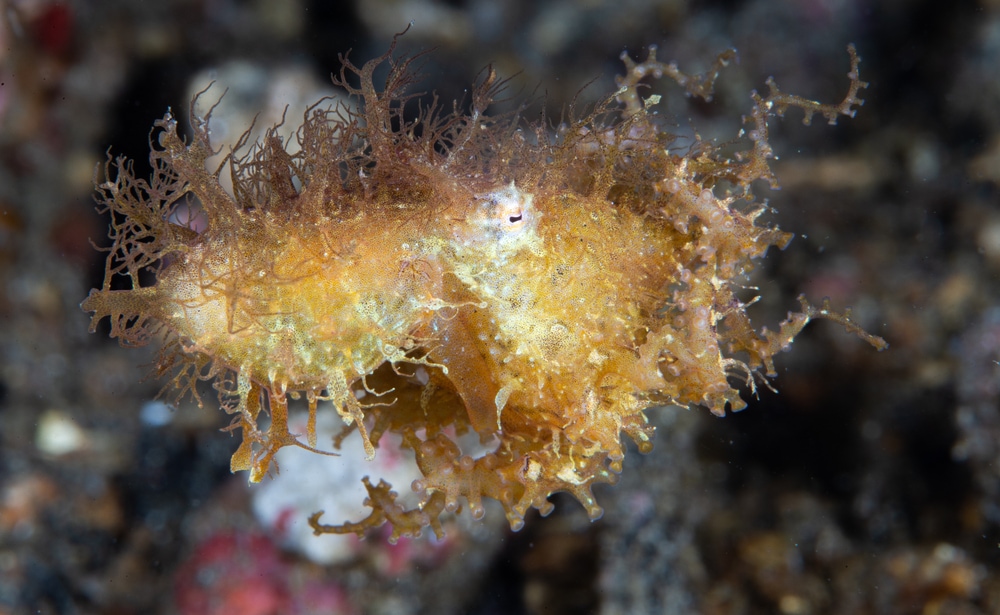
We don’t know much about hairy octopuses because they’re so small and hard to spot. They are covered in thin flaps of skin that allow them to float around the ocean. These flaps of skin look like hair, which helps the octopuses stay hidden. These octopuses are so small that they only reach about 2in (5cm) long.
Lifespan: Unknown
The Blue-Ringed Octopus (genus Hapalochlaena) — The Most Deadly
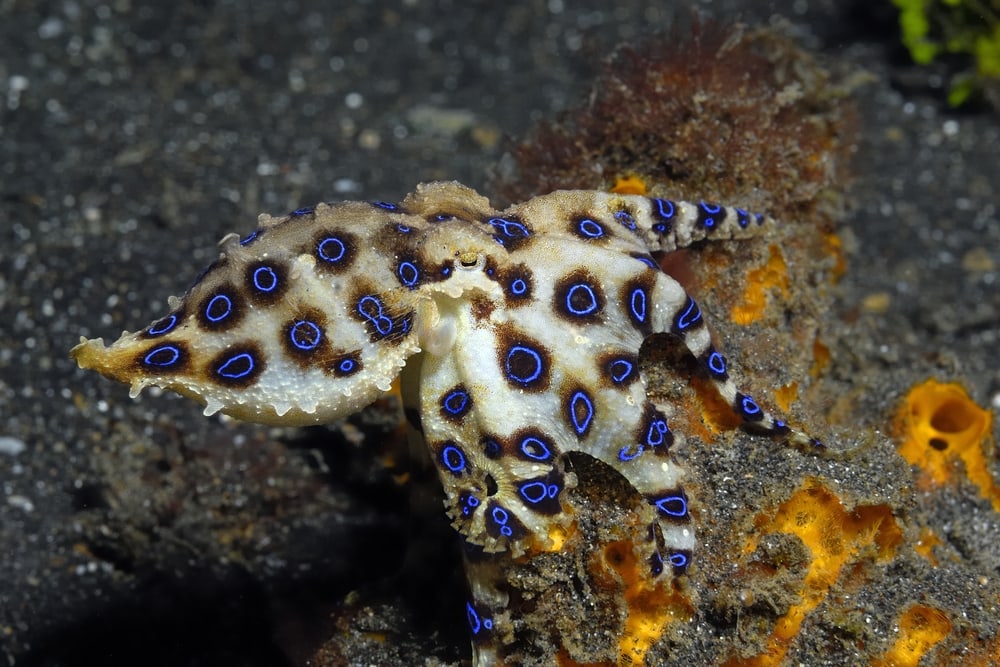
The blue-ringed octopus is one of the most dangerous animals in the ocean. Although the octopus is small, it contains enough venom to kill 26 adult humans in a matter of minutes. Researchers say that their venom is 1,000 times stronger than cyanide.
The good news is that this octopus isn’t aggressive. If you leave it alone, you shouldn’t be in any danger. But, its bite is painless, so if you do get bit, you might not know until it’s too late.
Lifespan: 12-18 months
The Mimic Octopus (Thaumoctopus mimicus) — A Master Of Disguise
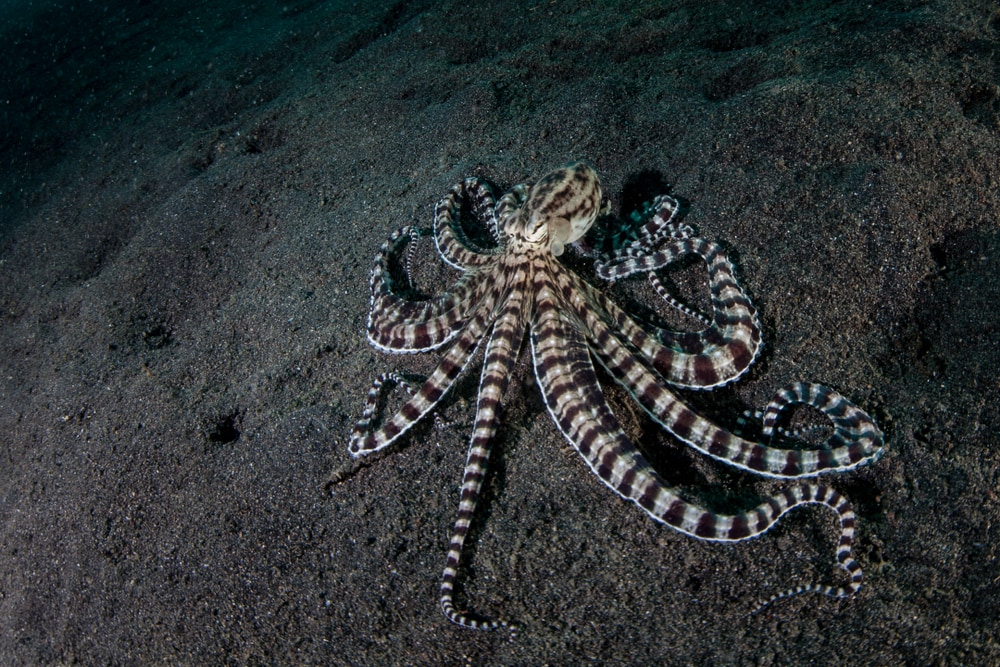
The mimic octopus has an impressive use of camouflage. Not only can it change its color, but it can also change the texture of its skin. Even more insane, this octopus can alter how it moves to mimic that of other sea creatures.
There are other kinds of animals that can mimic in similar ways. The mimic octopus is special because it can mimic more than one or two other species. Researchers conclude that they can mimic 15 other kinds of animals. Still, divers say they’ve seen them mimic far more animals than that.
You May Also Like: How Long Do Butterflies Live? Not As Long As You’d Think!
How Long Can an Octopus Stay Out Of Water?
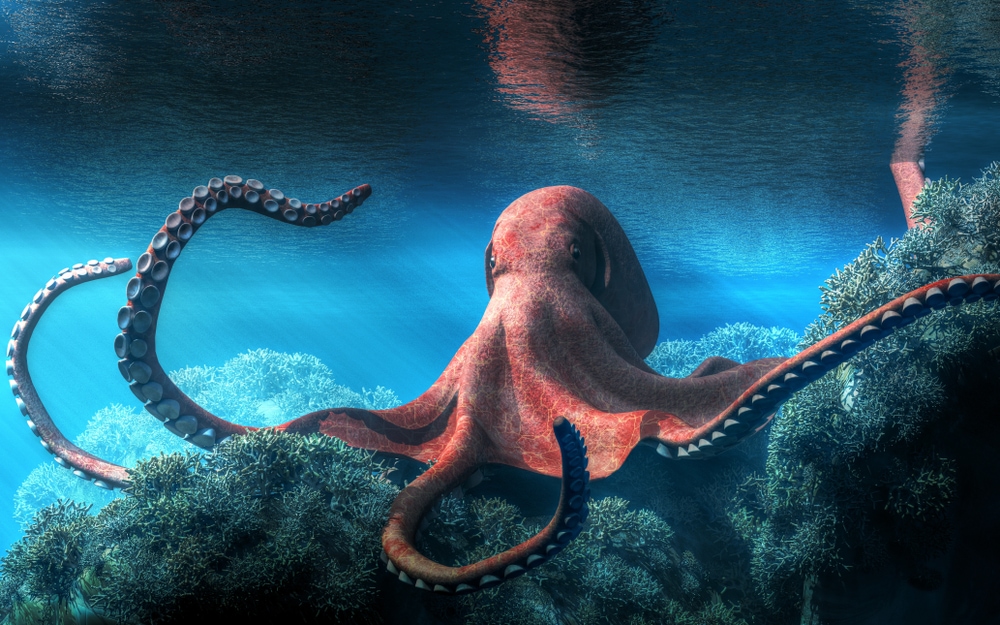
Although it’s not common, an octopus may come out of the water for a short time. This usually happens when an octopus is a pet, and the aquarium is not secured. Octopuses are incredible escape artists. They can squeeze through even the smallest of holes.
Fortunately, if this happens, there is time to get the octopus back into the water. Marine biologist Ken Halanych says octopuses can survive out of water for 20-30 minutes.
What Factors Affect An Octopus’s Life?
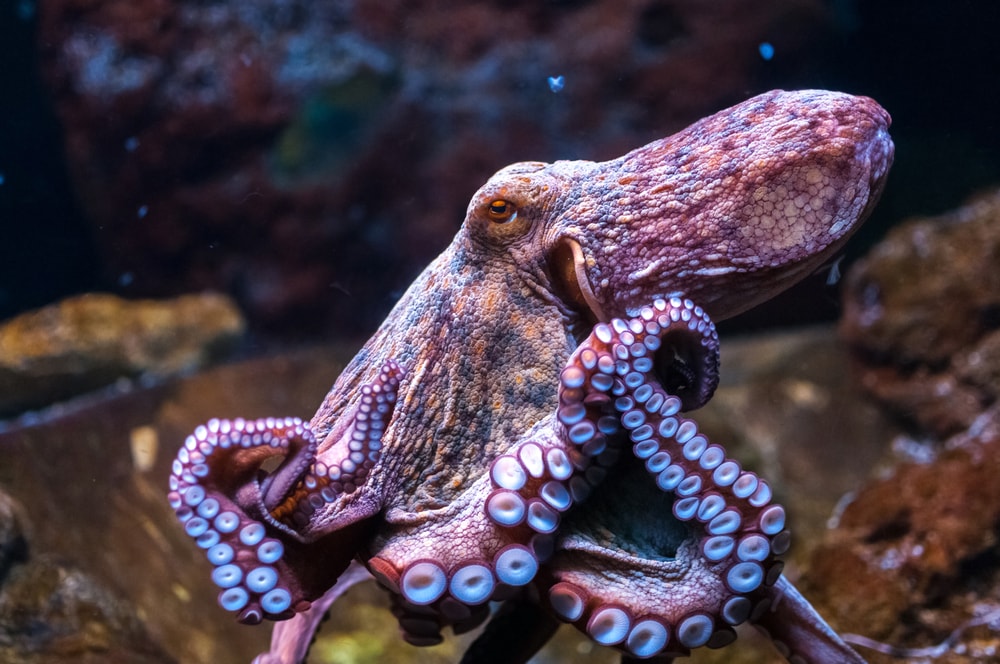
The main thing that affects an octopus’s life seems to be its species and size. Some species live longer than others. It also seems that larger species live longer than smaller species.
Human Interference
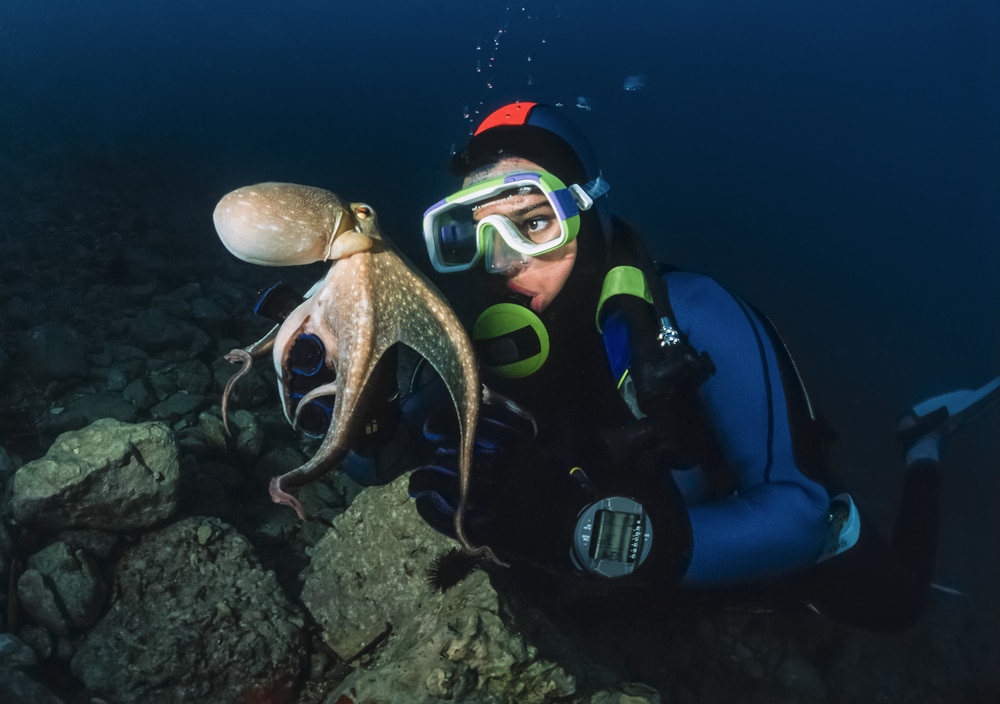
Although octopuses are not endangered, they do experience anthropogenic dangers. The main problems we are creating are climate change and pollution.
Warmer temperatures increase metabolic production, causing eggs to hatch more quickly. If the water is too warm, the eggs may hatch prematurely, lowering the chance of survival.
Warming waters also affect mature octopuses. Their metabolic rates also increase in warmer waters. So, they have to spend more energy than they would in cooler waters. This can leave them in increased danger from predators and limit their growth.
Ocean acidification is also a growing problem as we continue to pollute our oceans. Octopuses are incredibly sensitive to changes in water quality. So, any pollution will have detrimental effects on their lives.
Cannibalism
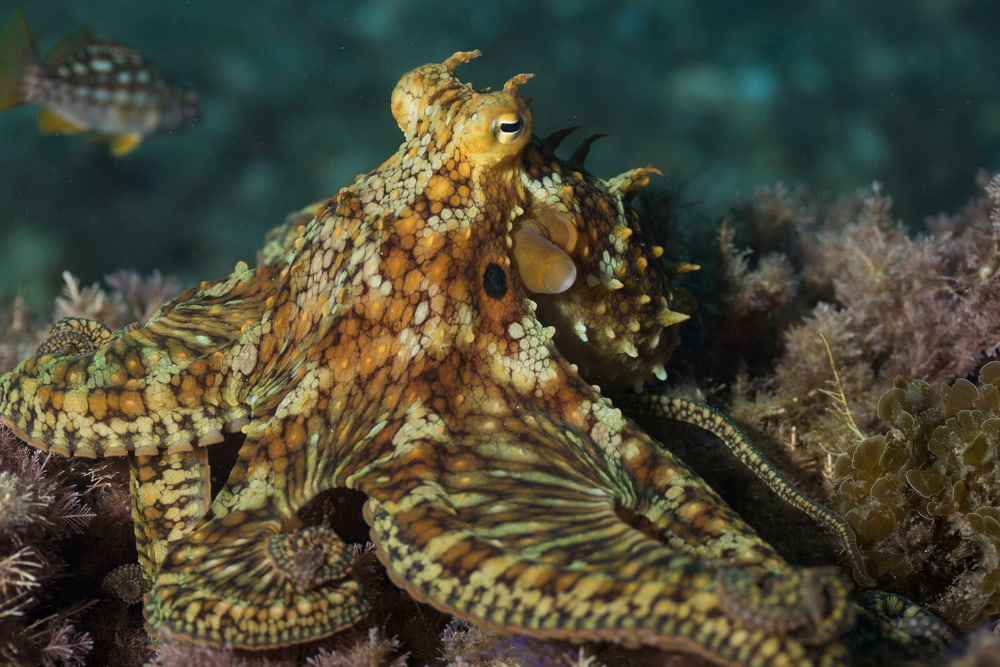
Researchers have known that octopuses are cannibalistic for years. They discovered this by observing partially-digested pieces of other octopuses within their stomachs. But, for the longest time, they weren’t sure why they were cannibalistic.
Now that researchers have been able to observe the behavior, it’s more clear. It seems that, in most cases, larger octopuses simply see smaller octopuses as a source of food. They take advantage of their size and availability as just another meal.
In other cases, researchers have observed females eating males after mating. They believe that females likely do this to gain easy nutrients. Taking care of eggs is a lot of work and energy. Eating their mate right after fertilization sets them up for early success.
Are Octopuses Endangered?
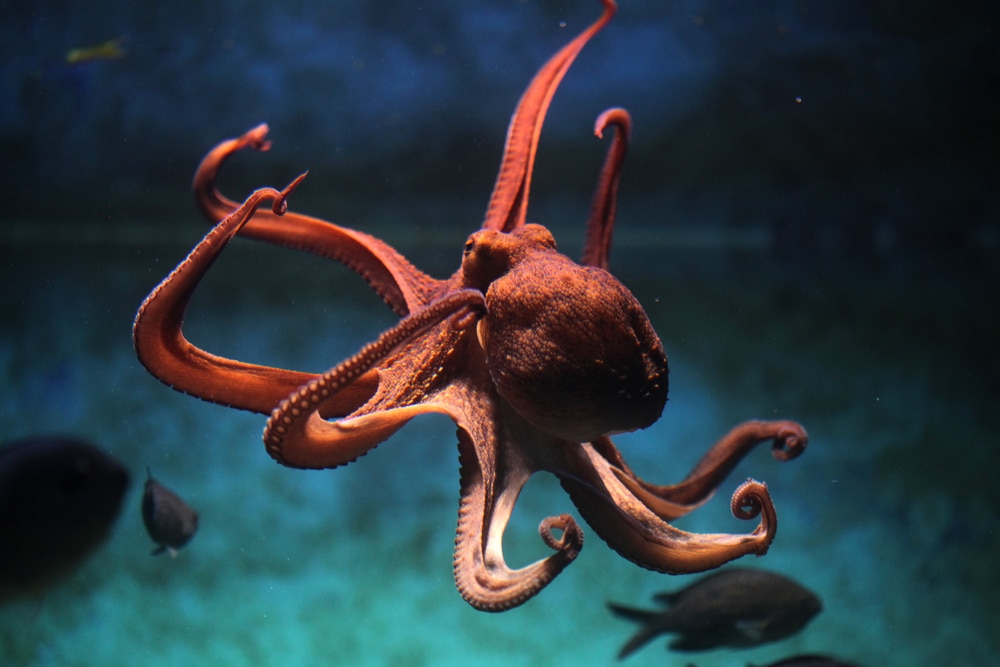
According to the IUCN Red List, most octopus species are considered of “least concern.” For many other species, we don’t have enough data to determine whether they are threatened or not. Overall, octopuses are not considered to be endangered.
Which Lives Longer: Octopuses or Squid?
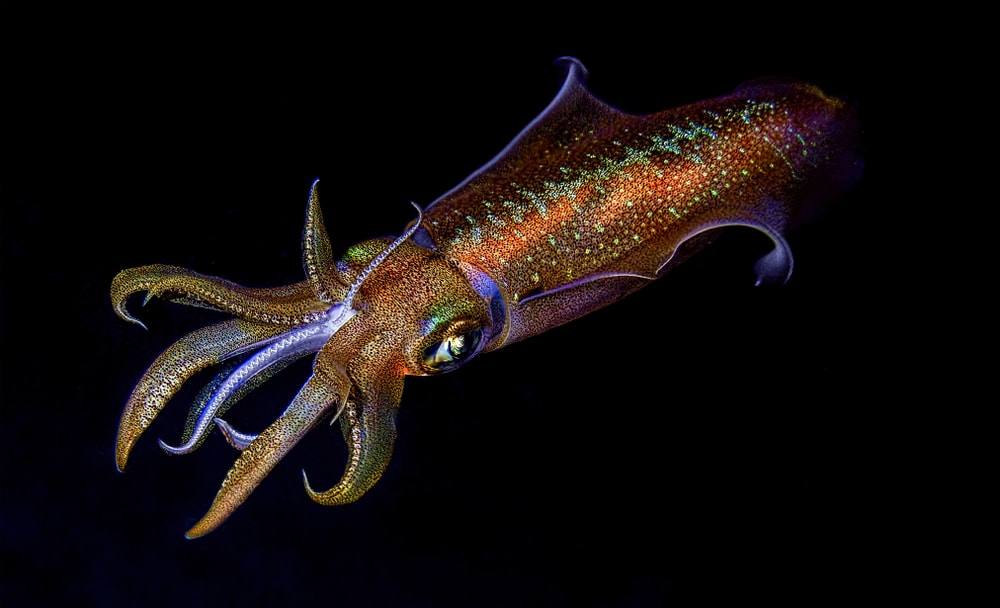
Octopuses and squid are very similar animals with similar lifespans. Neither really lives longer than the other unless you’re analyzing specific species. On average, most squid species will live for about 1-3 years.
Like octopuses, squid will also die shortly after mating.
FAQ
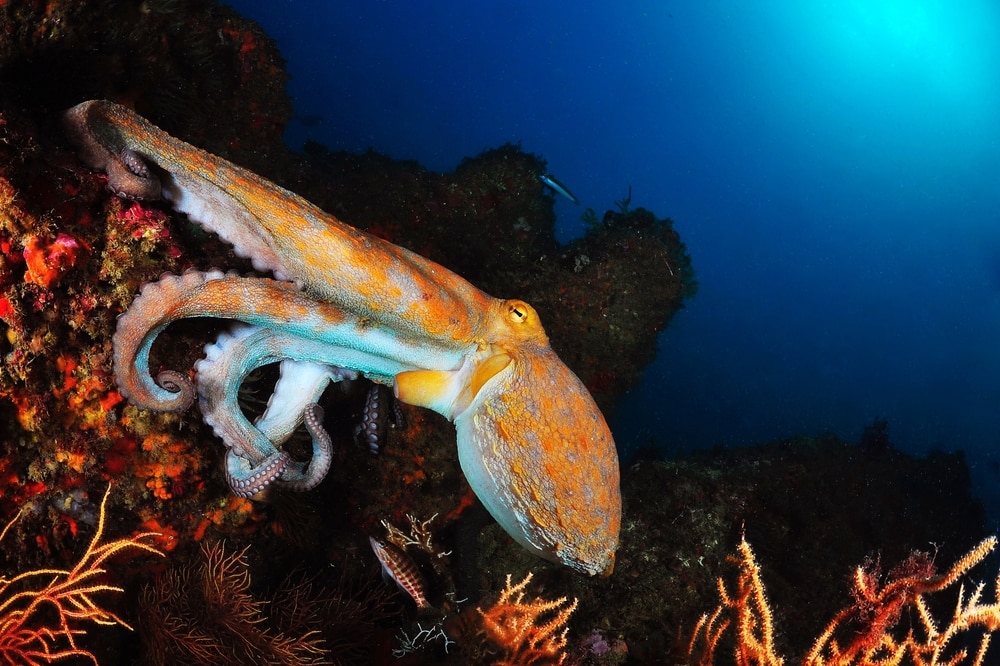
What Is the Longest Living Octopus?
The longest-living octopus is the Graneledone octopus (Graneledone boreopacifica), a deep-ocean-dwelling species. This species astonished researchers at the Monterey Bay Aquarium Research Research Institute (MBARI). They apparently discovered something interesting about this octopus’ long life and brooding period.
Most octopuses don’t live past 4 years of age. So, it’s shocking to see that these octopuses not only exceed that lifespan but spend 4.5 years brooding their eggs. This is the longest brooding period for any other animal on the planet.
Researchers aren’t completely certain how long these octopuses live. But, octopuses generally spend about a quarter of their lives brooding. So, this suggests that they may live for up to 16-18 years.
Is the Kraken an Octopus?
The Kraken, of course, is a mythological figure. It comes from Scandinavian folklore and is feared by sailors. Experts agree that the legend likely came after sailors saw giant squids. Giant squids look like octopuses and grow to an incredible length of 40-50ft (13-15m). That would be enough to scare anyone if you didn’t know what you were looking at!
The myth likely came about from sightings of giant squid. But, the representation of the figure more often resembles the body of an octopus.
How Intelligent Is an Octopus?
Octopuses are incredibly intelligent animals. I’ve already described several examples above. They can mimic other animals and use cans and shells as hiding spots. They are master escape artists. Plus, a part of their brain is dedicated solely to problem-solving.
Even more interesting, octopuses can control each of their eight arms separately. Some people describe them as having a “brain in each arm,” although this isn’t technically true.
They have specialized receptors in their suckers that can detect chemicals upon touch. They can use these sensors to interact with the environment. They can even do so by using each arm individually.
They also have a centralized brain that controls things from the top down. Initially, it didn’t seem like the brain could allow each arm to act independently.
But in 2011, researchers performed an experiment that proved otherwise. They discovered that the centralized brain could control the arms when needed. They tested octopuses so that they were unable to use their specialized receptors. As a result, they were forced to rely on their centralized brain to move their arms.
So, octopuses have both centralized and localized control over their actions.
How Many Hearts Does an Octopus Have?
Octopuses have three hearts and blue blood.
Their bodies, as well as ours, have a protein called hemocyanin. This protein carries oxygen throughout the body. In our bodies, there is iron in our hemoglobin which makes our blood red.
Rather than iron, an octopus has copper in its hemoglobin. Copper is more efficient in transporting oxygen in cold, low-oxygenated environments. Simply put, copper-based blood is better for life in the ocean.
In fact, an octopus’ blood does not always stay blue. When the animal dies, the blood becomes deoxygenated. This causes the blood to lose its blue color and turn clear instead.
Now, an octopus has three hearts because each heart has its own job to complete. One heart pumps blood throughout the body’s organs. The other two hearts focus on pumping blood past the gills so that the body can absorb oxygen.
Can an Octopus Be a Pet?
It is legal in most places to keep an octopus as a pet. Still, it’s only recommended for the most experienced aquarium keepers. Octopuses seem appealing as pets, but they’re difficult to care for and become bored easily.
You must ensure that your aquarium is completely secure, or your new pet may escape and dry up. Octopuses are also incredibly sensitive to changes in water quality. So, keeping on top of your water quality is an absolute must.
Second, because they’re incredibly intelligent, they get bored easily. Most people don’t have the time required to enrich an octopus, and that’s not fair for the animal. A properly-equipped tank isn’t workable for the average aquarium keeper.
Octopus tanks should have a variety of enrichment items like shells, pots, and beads. But, even when octopuses have all these things, they still seem to get bored. Under-stimulated octopuses often become distressed and begin self-mutilating.








